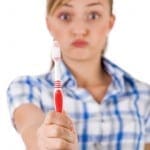When NOT To Brush Your Teeth
Tooth brushing is an integral part of a patients daily dental care. Tooth brushing and flossing are needed for healthy teeth and gums.
Proper Dental Care May Require Brushing Your Teeth Less

When NOT to Brush
“Brush teeth often!” is the directive dental office patients remember the most after the latest teeth cleaning appointment with the dentist. However dentists don’t want their patients tooth brushing their teeth in blind obedience the second any liquid or food passes their lips. Sometimes exposing your mouth to harsh bristles or gritty toothpaste at the wrong time or in the wrong way can cause damage to enamel or gums. Consider these points before initiating your next dental cleaning:
Don’t Tooth Brush After Consuming Acidic Foods or Liquids
If the first thing you grab after a hearty meal is the toothbrush and toothpaste, hold on a moment! Some liquids, like soda, contain phosphoric acids that temporarily soften enamel. Even “healthier” liquids and foods, like orange juice or citrus fruit, contains citric acid which also can weaken enamel. Think your teeth can handle a quick brush after downing a glass of orange juice? When enamel is weakened, the last thing it needs is the bristles of a toothbrush scraping over it and removing microscopic amounts. “Wait a second,” you might think, “only microscopic amounts? How bad can that be?” Plenty, if you consider that enamel is irreplaceable and will wear down naturally over time anyway. If you want to preserve your pearly whites while maintaining good tooth brushing habits, make sure you wash down acidic content with water and wait at least 20 minutes to brush. This will give your teeth time to recover, allowing the saliva time to wash the mouth out and strengthen the enamel.
Don’t Tooth Brush With a Hard Bristle Brush
Think that tooth brushing your teeth is like scrubbing the floor – the harder you scrub, the better the results? Not necessarily. Hard bristles cause unnecessary wear on enamel and don’t clean teeth as thoroughly as softer bristles. Hard bristles press down firmly, yet aren’t pliable enough to reach into tight spots, where all the real damage occurs. Soft bristles are flexible, able to bend around corners and into cracks, sweeping away food particles and stubborn bacteria without scraping the enamel. Using too firm of a toothbrush can also lead to gum recession, since regular brushing with a hard bristle toothbrush scratches and pushes at the gum line without allowing it time to recover. When picking out a new toothbrush, be sure to stay away from hard and medium bristle brushes and only go for the soft kind or, even better, extra soft bristles! It may take a while to get used to tooth brushing with softer bristles, but your enamel will thank you.
Don’t Brush Your Teeth Excessively
Please brush your teeth at least twice a day, preferably three times a day. But once you’ve cleaned out your mouth three times in a day, reconsider before heading to the sink for a fourth brush. In the same way that brushing with a hard bristle brush can damage teeth, brushing too often can also cause damage to the enamel and gums. If you are extremely conscientious (or have compulsive tendencies) consider other ways of cleaning your teeth. Drink lots of water to help rinse your mouth and replenish saliva, which in turn provides minerals that helps protect enamel. Eat firm, crunchy vegetables that are high in water content and low in sugar, like celery. Fresh fruits, like apples, can also be beneficial, though they may contain more sugar than preferable. If you are an excessive tooth brusher, try out these other options to clean your teeth, and remind yourself that not only are you washing out your mouth, you’re contributing to your body’s overall wellness.
Brush Your Teeth Intelligently
The next time you consult a dentist and he reminds you to tooth brush, keep in mind that he wants you to do so practically. When getting up from a meal, pause a moment before grabbing the toothbrush and toothpaste and consider if it might be better to drink some water, get a better toothbrush, or just give your teeth a little while to recover from any acidic food you may have eaten.
Dallas Dental Office News Update, By Dallas Texas Dentist, William H. Miller
Woodhill Medical Park, 8305 Walnut Hill Lane, Suite 235, Dallas, Texas, 75231
Phone: (214) 692-1050

Comments are closed.